八年级英语下册 Unit 5 International charities Sdudy skills教案 牛津版
八年级英语下册《Unit 5 International charities》Period 3 Reading II教案 牛津版
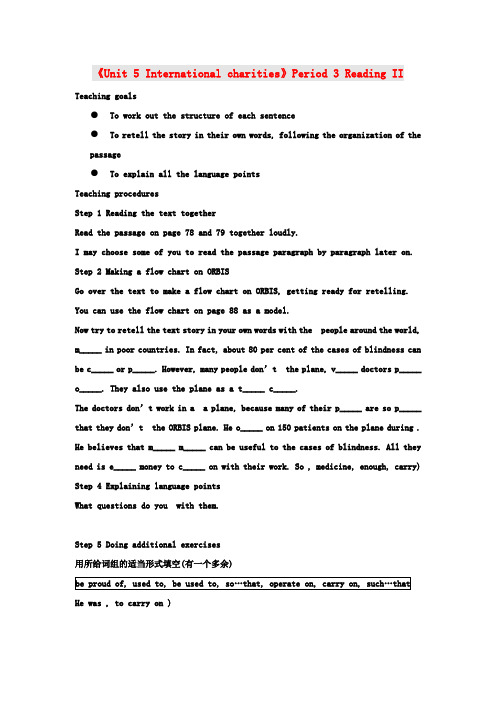
《Unit 5 International charities》Period 3 Reading II Teaching goals●To work out the structure of each sentence●To retell the story in their own words, following the organization of thepassage●To explain all the language pointsTeaching proceduresStep 1 Reading the text togetherRead the passage on page 78 and 79 together loudly.I may choose some of you to read the passage paragraph by paragraph later on. Step 2 Making a flow chart on ORBISGo over the text to make a flow chart on ORBIS, getting ready for retelling. You can use the flow chart on page 88 as a model.Now try to retell the text story in your own words with the people around the world, m_____ in poor countries. In fact, about 80 per cent of the cases of blindness can be c_____ or p_____. Ho wever, many people don’t the plane, v_____ doctors p_____ o_____. They also use the plane as a t_____ c_____.The doctors don’t work in a a plane, because many of their p_____ are so p_____ that they don’t the ORBIS plane. He o_____ on 150 patients on the plane during . He believes that m_____ m_____ can be useful to the cases of blindness. All they need is e_____ money to c_____ on with their work. So , medicine, enough, carry) Step 4 Explaining language pointsWhat questions do you with them.Step 5 Doing additional exercises用所给词组的适当形式填空(有一个多余)He was , to carry on )。
【春季——开学备课】(牛津版)八年级英语下册【教案三】Unit5Internationalcharities
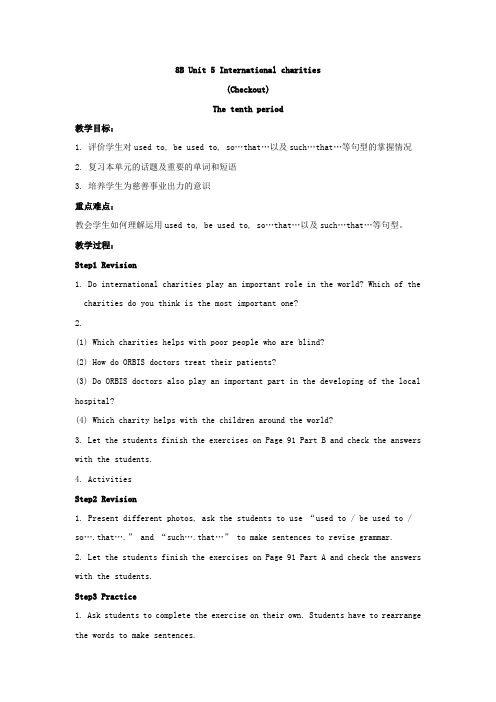
8B Unit 5 International charities(Checkout)The tenth period教学目标:1. 评价学生对used to, be used to, so…that…以及such…that…等句型的掌握情况2. 复习本单元的话题及重要的单词和短语3. 培养学生为慈善事业出力的意识重点难点:教会学生如何理解运用used to, be used to, so…that…以及such…that…等句型。
教学过程:Step1 Revision1. Do international charities play an important role in the world? Which of the charities do you think is the most important one?2.(1) Which charities helps with poor people who are blind?(2) How do ORBIS doctors treat their patients?(3) Do ORBIS doctors also play an important part in the developing of the local hospital?(4) Which charity helps with the children around the world?3. Let the students finish the exercises on Page 91 Part B and check the answers with the students.4. ActivitiesStep2 Revision1. Present different photos, ask the students to use “used to / be used to / so….that….” and “such….that…” to make sentences to revise grammar.2. Let the students finish the exercises on Page 91 Part A and check the answers with the students.Step3 Practice1. Ask students to complete the exercise on their own. Students have to rearrange the words to make sentences.2. Finish the exercises on the slides.Step4 Homework1. Revise the contents in this unit2. Writing five sentences with each structure.板书设计:8B Unit 5 Checkoutused to be used toso….that…. such….that教学反思:Students can review the new grammar and vocabulary items learned in the unit. Students should be encouraged to work on their own. If they have difficulties completing the exercises, they can go back and review the relevant sections in the unit before moving to the next unit.。
2019-2020年八年级英语下册 Unit 5 International charities 教案2 牛津版
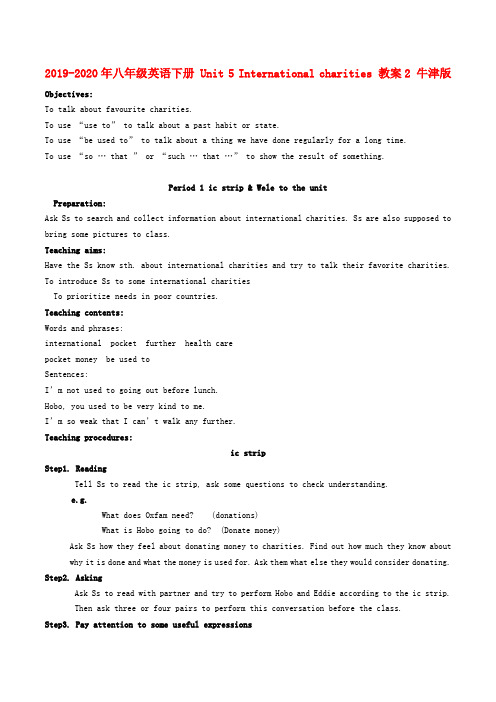
2019-2020年八年级英语下册 Unit 5 International charities 教案2 牛津版Objectives:To talk about favourite charities.To use “use to” to talk about a past habit or state.To use “be used to” to talk about a thing we have done regularly for a long time.To use “so … that ” or “such … that …” to show the result of something.Period 1ic strip & Wele to the unitPreparation:Ask Ss to search and collect information about international charities. Ss are also supposed to bring some pictures to class.Teaching aims:Have the Ss know sth. about international charities and try to talk their favorite charities. To introduce Ss to some international charitiesTo prioritize needs in poor countries.Teaching contents:Words and phrases:international pocket further health carepocket money be used toSentences:I’m not used to going out before lunch.Hobo, you used to be very kind to me.I’m so weak that I can’t walk any further.Teaching procedures:ic stripStep1. ReadingTell Ss to read the ic strip, ask some questions to check understanding.e.g.What does Oxfam need? (donations)What is Hobo going to do? (Donate money)Ask Ss how they feel about donating money to charities. Find out how much they know about why it is done and what the money is used for. Ask them what else they would consider donating. Step2. AskingAsk Ss to read with partner and try to perform Hobo and Eddie according to the ic strip.Then ask three or four pairs to perform this conversation before the class.Step3. Pay attention to some useful expressions1) …leftT: What does “left” mean here?e.g. There are only three students left.2) be used to doinge.g. He is used to getting up before 6:30 every morning.3) too…to…e.g. He is too weak to walk any further.Step4. How charities help peopleT asks Ss to present their information and pictures of international charities and say sth. about their charities. Ss exchange their ideas.Assignment: Make a dialogue according to the ic strip. Ss should replace Oxform and use other words.Wele to the unitStep5. T introduces background informationThere are many international charities helping needy people and worthy causes all over the world. Look at some symbols in Part A. T uses these symbols to present the following charities. T puts the pictures with these symbols on the blackboard.Step6. TalkingTalk about international charities and the work they do. Ask Ss Which international charities they know and write a list on the board.Step7. Tell Ss To look at the symbols in Part A and the names of the charities in the box. Ask them to write the names of the charities under the pictures. Tell them to try to do the task on their own first, then pare answers with a partner.Step8. Check answers as a class. Then Ss How much they know about what the charities in Part A do and how they help people.Step9. Talk about what life is like for people who are very poor. Ask Ss to think about how their lives might be different if they had almost no money.Step10. Divide the class into pairs. Ask Ss to look at the list of items in Part B and decide which items are the most important and which items are the least important for people in poor countries.Assignment:Be able to know more international charities and try to remember their full names. Exercises:据句意、首字母和中文意思完成句子。
牛津译林版英语八下《Unit 5 International Charities》(Main task)ppt课件1
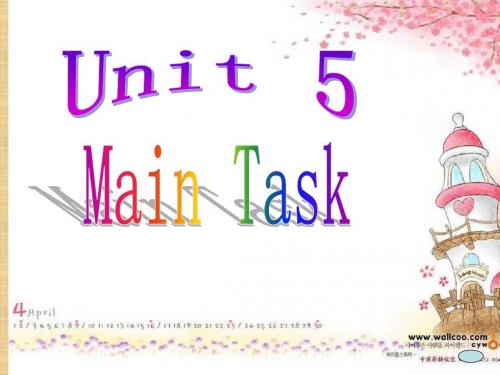
2 3
4 5
Now, Mary works for ORBIS. She is used to working on a plane and is not afraid of flying any more.
A trip to International charities !
Mary
Rearrange the sentenses
Rearrange the following in the right order.
3
5
_________ Now, Mary works for ORBIS. She is used to working on a plane and is not afraid of flying any more. I think Mary really cares___________ about other people and wants to help them. She does an important job and many people are grateful to her. I hope to have a job like Mary’s when I finish school. _____________ One day, Mary saw a TV programme about ORBIS. She learned about the flying eye hospital. She wanted to help poor people so much that she decided to go back to school and train as a nurse. _____________ Mary says that she loves helping people see again and teaching other nurses. She says she also enjoys visiting schools and telling students about her work. Mary used to work in the office of a big company. She used to travel by car because she was afraid of flying. ____________
八年级英语下册《Unit 5 International charities》Period 9 Main task教案 牛津版
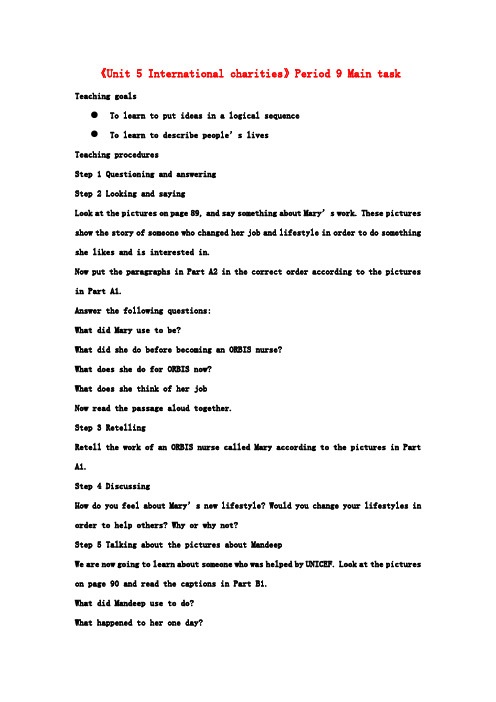
《Unit 5 International charities》Period 9 Main task Teaching goals●To learn to put ideas in a logical sequence●To learn to describe people’s livesTeaching proceduresStep 1 Questioning and answeringStep 2 Looking and sayingLook at the pictures on page 89, and say something about Mary’s work. These pictures show the story of someone who changed her job and lifestyle in order to do something she likes and is interested in.Now put the paragraphs in Part A2 in the correct order according to the pictures in Part A1.Answer the following questions:What did Mary use to be?What did she do before becoming an ORBIS nurse?What does she do for ORBIS now?What does she think of her jobNow read the passage aloud together.Step 3 RetellingRetell the work of an ORBIS nurse called Mary according to the pictures in Part A1.Step 4 DiscussingHow do you f eel about Mary’s new lifestyle? Would you change your lifestyles in order to help others? Why or why not?Step 5 Talking about the pictures about MandeepWe are now going to learn about someone who was helped by UNICEF. Look at the pictures on page 90 and read the captions in Part B1.What did Mandeep use to do?What happened to her one day?What does she do now?What does she say?What do you think of UNICEF?。
八年级英语下册 Unit 5 International charities Vocabulary精品学案 牛津译林版
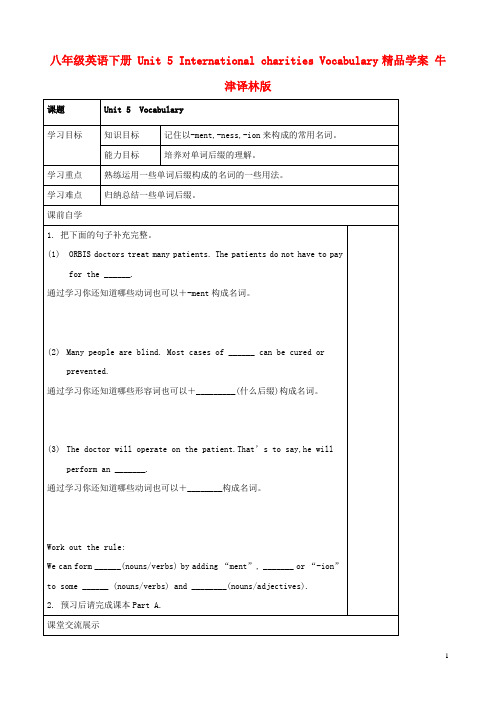
ORBIS is an international _________ (organize) . It understands that the public needs ___________ (educate) on eye care. ORBIS is able to provide good and free eye ____________ (treat) to patients.
课堂达标检测
Have a try!
1.He didn’t come to school yesterday because of his _________(ill).
2.Would you please show me your __________ (collect).
3.Look, there is an _____________ (advertise) on the wall.
( )3.The fans got very ________ when the pop stars were introduced by the host
A excitement B exciting C excited D excite
( )4. Mr Wu, we’d like you to give us advice on how to _______ our spoken English.
学习难点
归纳总结一些单词后缀。
课前自学
1. 把下面的句子补充完整。
(1) ORBIS doctors treat many patients. The patients do not have to pay for the ______.
通过学习你还知道哪些动词也可以+-ment构成名词。
2021年八年级英语下册 Unit 5 International charities 教案 牛津版
2019-2020年八年级英语下册 Unit 5 International charities 教案1 牛津版You can help by making a donation or doing some voluntarywork.I used to spend all my pocket money on clothes and snacks.What do you think about UNICEF?Many of our patients are so poor that they can’t affordto travel to hospital.Dr Ma has done such an important job that people must bereally grateful to him.Period 1 ic strips & wele to the unit(How charities help people, Charities around the world)Teaching goals●To introduce students to some international charities●To learn to use ‘used to’ and ‘be used to’Teaching proceduresStep 1 Warming up by questioningWhat charities in China do you know of? What do they help?In this unit, we’ll le arn some international charities. Whatinternational charities do you know of?Have you ever heard of famous international charities like:ORBIS, Oxfam, UNICEF, World Vision and World Wide Fund forNature?Step 2 Finishing off Part AOn page 77 are some logos or pictures. Could you match the logos with the charities? I will checkthe answers later on.Step 3 DiscussingWhat do you think people in poor countries need most? Do they get help from international charities? What can you do for charities? (We can donate our pocket money to them.)Step 4 Listening and answeringOxfam needs money to carry on with their work.Who calls for donating pocket money to Oxfam? (Hobo)Will he donate his own pocket money? (No)Whose pocket money does he want to donate? (Edd ie’s)When does he want to go to donate money? (Right now, at lunchtime)Does Eddie agree? (Of course not)Why not? (He doesn’t often go out before lunch. That is to say, he isn’t used to going out before lunch.)What does Eddie think of Hobo? (Hobo was ki nd to him before, but now he isn’t. That is to say, Hobo used to be kind to Eddie.)Where will Hobo take Eddie to have lunch?Do you think Eddie is willing to go to Oxfam right now?Why?Step 5 Reading aloud and writing down expressionsNow read after the tape sentence by sentence.You are given five minutes to find out and write down all the useful expressions in this part. Go over page 76 and 77 again to underline all the useful expressions.Step 6 Reading and actingRead the dialogue aloud and act it out in pairs.Step7 Retelling the storyToday Hobo tells Eddie that Oxfam needs money. He remembers that Eddie has some p_____ money l_____ , so he asks Eddie to go and donate some of it. But Eddie says that he always has l_____ at twelve o’clock. He isn’t u_____to g_____out before lunch. “Don’t w_____ .” Hobo says, “We can have a big lunch a_____ .” At last, Eddie has to go with Hobo and he says sadly, “You u_____ to be very k_____ to me, but now I’m so w_____ that I can’t walk any f_____ . ” “OK, I’ll t _____ you to a new r_____ . It’s n_____ to the Oxfam shop.” Hobo says happily. Do you believe what he says?(Keys: pocket, left, used, going, worry, afterwards, used, kind, weak, further, take, restaurant, next)Step 8 Homeworka. Read the ic strips and try to remember it. Try your best to act it out.b. Finish off the exercises in the Evaluation Handbook.Period 2 Reading I(An interview with an ORBIS doctor)Teaching goals●To learn to guess meanings of new words from the context●To learn to skim text for overall meanings and scan for details●To understand the structure of difficult sentencesTeaching proceduresStep 1 PresentingWhat international charities do you know about?What do they do?Have you heard of ORBIS?ORBIS helps blind people in poor countries. The state of being blind is called blindness. Why does ORBIS help the blind patients? Because blindness affects many people around the world, mostly in poor countries. But most of the cases of blindness can be prevented or cured. Why don’t the blind go to see doctors? Because they are so poor that they can’t pay for medical treatment. ORBIS doctors treat them for free. They operate on/do (perform) operations on t heir patients.So the patients are thankful /grateful to them. How do you think ORBIS doctors feel when they help people? (They feel proud.)Step 2 Finding out expressionsGo on to page 78 and 79 read the interview and underline all the useful expressions.Step 3 Listening and answeringNow listen to the tape, and then answer the following questions:How many people around the world are affected by blindness?How many cases of blindness can be prevented or cured?Where do ORBIS doctors work?What does ORBIS need?Step 4 Reading silently and finishing off Part B2Read the text silently again.Try to fill in the blanks in Part B2, checking your answers against your partner’s. (Keys: operations, skills, knowledge, grateful, patients, cured, donations)Step 5 Finishing off Part CPut the sentences together in Part C, then checking the answers with your partners.(Keys: 1e, 2f, 3a, 4c,5d,6b; 1charity, 2blind,3eye, 4hospital, 5doctors, 6treat, 7teach, 8operations)Step 6 Reading after the tapeNow read after the tape sentence by sentence. Pay attention to the sense groups within thesentences.Step 7 Doing additional exerciseAsk students to tell if the following statements are “True” or “False” according to the text.1.Blindness affects about 45 million people around the world, mostly in western countries. F2.Many blind people have no money for medical treatment. T3.Local doctors perform operations on the plane instead of in the hospital because it is morefortable on the plane. F4.Dr. Ma used to do one or two operations a day. F5.Patients are very grateful to ORBIS doctors. TStep 8 Homeworka. Read after the tape five times. Your parent’s signature is needed.b. Finish the exercises in the Evaluation Handbook.Period 3 Reading II(An interview with an ORBIS doctor)Teaching goals●To work out the structure of each sentence●To retell the story in their own words, following the organization of the passage●To explain all the language pointsTeaching proceduresStep 1 Reading the text togetherRead the passage on page 78 and 79 together loudly.I may choose some of you to read the passage paragraph by paragraph later on.Step 2 Making a flow chart on ORBISGo over the text to make a flow chart on ORBIS, getting ready for retelling.You can use the flow chart on page 88 as a model.Now try to retell the text story in your own words with the help of the flow chart.Step 3 Retelling the storyBlindness affects about 45 million people around the world, m_____ in poor countries. In fact,about 80 per cent of the cases of blindness can be c_____ or p_____. However, many people don’t have e_____ money for m_____ t_____.ORBIS is a c_____ that helps the poor with e_____ problems. It uses a f_____ eye hospital to visit poor countries. On the plane, v_____ doctors p_____ o_____. They also use the plane as a t_____ c_____.The doctors don’t work in a hospital bu t on a plane, because many of their p_____ are so p_____ that they don’t have the money to t_____ to hospital. So the ORBIS doctors have to go to them. They also t_____ the l_____ doctors and nurses new s_____ and k_____ .They hope to help more people by t_____ them.Dr. Ma is a doctor on the ORBIS plane. He o_____ on 150 patients on the plane during his last v_____ . It’s hard work but he is used to it now. Of course, many people are very g_____ to him because he has helped them see again. He believes that m_____ m_____ can be useful to the cases of blindness. All they need is e_____ money to c_____ on with their work. So he hopes that more and more people will support their by sending donations to ORBIS.(Keys: mostly, cured, prevented, enough, medical treatment, charity, eye, flying, volunteer, perform, operations, teaching, center, patients, poor, travel, teach, local, skills, knowledge, treating, operated, visit, grateful, modern, medicine, enough, carry)Step 4 Explaining language pointsWhat questions do you have about the following language points? Now make sentences of your own with them.1. operate on sb.=perform/do an operation on sb.2. used to do/ be used to doing3. so…that/such…that4. carry on with…5. be proud to do/ be proud of…6. improve o ne’s life7. be grateful to sb. for sth.Step 5 Doing additional exercises用所给词组的适当形式填空(有一个多余)1.He was hurt __________ badly ___________ we had to send for a doctor.2.The little girl ____________ washing her hands before meals now.3.I am ____________ Liu Xiang because he is the pride of our country.4.I ___________ spend my pocket money playing puter games. It’s bad for my study.5.The old doctor ______________ the patient last Sunday.6.We need enough money __________ our work, so we need your support.(Keys: so…that, is used to, proud of, used to, operated on, to carry on )Step 6 Doing an extension activitya.Think about what we can do to support ORBIS.b.Introduce one charity that you know very well.Step 7 Homeworka. Act out the interview.b. Tell your parents about ORBIS.Period 4 Vocabulary(Suffixes ‘-ment’, ‘-ness’ and’-ion’)Teaching goals●To develop an understanding of suffixes●To use proper verbs and adjectives in contextTeaching proceduresStep 1 Having a revisionTo begin with, answer my questions about Reading:What kind of people go to ORBIS for help? (Blind and poor people.)Can most cases of blindness be cured or prevented? (Yes.)What do ORBIS doctors do? (They treat many patients.)Do the patients need to pay for the treatment? (No.)How do ORBIS doctors treat them? (They operate on them.=They perform operations on them.) What is the relationship between “blind”and “blindness, “treat”and “treatment”, “operate” and “operation”?W e can form nouns by adding suffixes ‘-ment’, ‘-ness’, or ‘-ion’ to some verbs and adjectives. Sometimes we need to change the ending of the verb or adjective before we add the suffix.happy-y+i+ness=happ inesscelebrate-e+ion=celebrat ioninvite-e+ation=invit ationStep 2 Finishing off Part AGo to page 82 to help Daniel to change verbs and adjectives into nouns, checking the answers with your partner. Think of more examples if you can.Step 3 Finishing off Part BFill in the blanks in Part B on page 82. Then read the e-mail aloud.Step 4 Doing additional exercises用括号中所给词的适当形式填空1.The children in poor countries have to _____ empty bottles to earn money. Last term our schoolmade a _____ for children in poor areas. (collect)2.He could not pay his rent, so he had to _____ out. There was too much _____ of cars on thecity roads. (move)3.Old people live a _____ life in our country. It’s a great _____ for us to wele you here. (happy)4.The teacher always _____ her students as her children. The new _____ for blindness makes somepatients see again. (treat)5.Traveling by coach makes us feel _____ all the way. There isn’t much _____ here this year.(sick)(Keys: collect, collection; move, movement; happy, happiness; teats, treatment; sick, sickness ) Step 5 Homeworka. Read and learn these suffixes heart.b. Finish off the exercises in the Evaluation Handbook.Period 5 Grammar I(‘Used to’ and ‘Be used to’)Teaching goals●To use ‘used to’ to talk about a past habit or state●To use ‘be used to’ to talk about what we have done regularlyTeaching proceduresStep 1 Having a revisionDo you still remember Dr. Ma? What is he? (A doctor.)Where did he work in the past? (In the hospital.)Where does he work now? (On the ORBIS plane.)So we can say Dr. Ma used to work in the hospital. We use ‘used to’ to talk about a past habit or state. We can use an infinitive after ‘used to’.Step 2 PracticingS ay something about Dr. Ma’s life when he worked in a hospital using ‘used to’.Step 3 Doing an extension activityI am going to tell you about my own life.I used to live in …I used to go to … Secondary school.I used to play badminton twice a week.…Show a photo of your family. In pairs, tell each other what your lives were like in the past. Each student should make up at least 3 sentences with ‘used to’.Step 4 PresentingNow Dr. Ma works on the ORBIS plane. He lives a life which is different from the one in the past. But he is used to his new life. He is used to working on the ORBIS plane.We use ‘be used to’ to talk about something we have done regularly for a long time so that it is not new any more. We put it before a noun (phrase) or an “-ing” form of a verb.Step 5 Finishing off the exercisesGo to page 83 to finish exercises in Part A, B and C in pairs.Step 6 Doing an extension activityHow have your lives changed since you started secondary school?What new experiences and routines were you not familiar with at first? Like the different method of traveling to school, larger school size, different uniforms, more subjects offered. Work together to formulate sentences to express the idea of being accustomed to something.I am used to taking the bus to school.I am used to the larger classes at secondary school.I am used to wearing the school uniform.I am used to studying more than 10 subjects a week.Step 7 ing to a summarypare ‘used to’ and ‘be used to’, and then work out the rule on page 84.Step 8 Homeworka. Review what we have learnt.b. Finish off the exercises in the Evaluation HandbookPeriod 6 Grammar II(Using ‘so…that’ and ‘such…that’)Teaching goals●To learn to use ‘so…that’and ‘such…that’Teaching proceduresStep 1 PresentingWhat do you want to be in the future? What do you think of the job of teaching?I think educating students is a long process and it is very important. We must be patient enough. That is to say educating students is so important that teachers must be patient enough. = Educatingstudents is such a long process that we must be patient enough.We use ‘so…that’or ‘such…that’ to show the result of something. We can use an adjective or an adverb between ‘so’ and ‘that’, and we use a noun or a noun phrase between ‘such’ and ‘that’.Step 2 PracticingShirley wants to be a doctor when she grows up. Amy is now telling her what a doctor’s life is like. Help her bine what she is saying with ‘so…that’ or ‘such…that’. (Page 85)Step 3 Doing an extension activityLook at these pictures. We are to make sentences using ‘so…that’ and ‘such…that’. Picture1: A little boy wants to get the apple on the table. But he is too short. →The little boy is so short that he can’t get the apple on the table. →He is such a little boy that he can’t get the apple on the table.→The little boy is too short to get the apple on the table.Step 4 ing to a summaryWork out the rule about‘so…that’ and ‘such…that’.S tep 5 Homeworka. Go over what we have learnt.b. Finish off the exercises in the Evaluation Handbook.Period 7 Integrated skills(Writing, reading and speaking up) Teaching goals●To listen for and identify specific information about UNICEF●To respond to a written text and information got from listening●To talk about favorite charitiesTeaching proceduresStep 1 PresentingWhat international charities do you know about? Which charity can help you with your eye problems? Do the ORBIS doctors volunteer to do the work? Yes. They are volunteers. They do some voluntary work.We have known something about the work of ORBIS. Today, let’s talk about the work of UNICEF. Step 2 Reading and answeringAsk students to read the article in Part A2 and answer the following questions:Which charity is this article talking about?When and where was it set up?Why was it set up?How many countries and areas does UNICEF work in?What does UNICEF help?Step 3 Listening and finishing off Part A1Listen to Part A1 and put the sentences in the correct order.Check on your answers in pairs.More questions about UNICEF:What does UNICEF provide?How does UNICEF raise money?How can we help UNICEF?Step 4 Finishing off Part A 2, A 3 and A4.Fill in the blanks in Part A 2, A 3 and A4, checking on the answers and read the sentences aloud. Step 5 Reading after the tapeRead after the tape sentences by sentence, paying attention to the sense groups within the text. Step 6 Finding and copying expressionsGo over page 86 and 87 again to find and copy all the useful expressions.Step 7 Making up new dialoguesTo speak up let’s go on to make up new dialogues using Part B as a model.Step 10 Homeworka. Listen, repeat and recite the dialogue in Part B.b. Finish off the exercises in the Evaluation Handbook.Period 8 Study skills(Making flow charts)Teaching goals●To learn to show ideas by a flow chartTeaching proceduresStep 1 Learn how to make a flow chartStep-by-Step process of how to develop a flow chart●Gather information of how the process flows: use a)conservation, b)experience, or c)productdevelopment codes.●Trial process flow.●Allow other more familiar personnel to check for accuracy.●Make changes if necessary.●pare final actual flow with best possible flow.Step 2 Practicinga. Look at Show Amy’s unfinished flow chart on page 88. Fill in words in the blanks.b. Retell about ORBIS in your own words with the help of the flow chart.Step 3 Designing a flow chartFind facts about UNICEF. Design a flow chart of it.In pairs try to prepare a flow chart to explain a familiar activity like:How to travel from Nanjing to the Yellow Mountain?How to organize a fund-raising activity?How to make their favourite dish?How to operate a CD player?How to play your favourite puter game?I will ask a few pairs to write their flow charts on the board.Step 4 HomeworkFinish off the exercises in the Evaluation Handbook.Period 9 Main task(A charity work, A helping hand from UNICEF)Teaching goals●To learn to put ideas in a logical sequence●To learn to describe people’s livesTeaching proceduresStep 1 Questioning and answeringCan you say something about the work of an ORBIS doctor or nurse?Where do they work?Are they afraid of flying?What do they have to do before being ORBIS doctors or nurses? (Trained as doctors or nurses. ) What kind of people are they? Why? (They really care about others.)What do you think of the work of an ORBIS doctor or nurse?Step 2 Looking and sayingLook at the pictures on page 89, and say something about Mary’s work. These pictures show the story of someone who changed her job and lifestyle in order to do something she likes and is interested in.Now put the paragraphs in Part A2 in the correct order according to the pictures in Part A1. Answer the following questions:What did Mary use to be?What did she do before being an ORBIS nurse?What does she do for ORBIS now?What does she think of her jobNow read the passage aloud together.Step 3 RetellingR etell the work of an ORBIS nurse called Mary according to the pictures in Part A1.Step 4 DiscussingHow do you f eel about Mary’s new lifestyle? Would you change your lifestyles in order to help others? Why or why not?Step 5 Talking about the pictures about MandeepWe are now going to learn about someone who was helped by UNICEF. Look at the pictures on page 90 and read the captions in Part B1.What did Mandeep use to do?What happened to her one day?What does she do now?What does she say?What do you think of UNICEF?Step 6 Finishing off Part B2W rite about Mandeep’s life. You can use the outline in Part B2 to help you. Use your own imaginations to describe details, events and feelings. Remember to make a flow chart before writing.I will ask a few students to present their reports to the class.Step 7 Homeworka. Write an article about somebody’s life which has something to do with a charity.b. Finish off the exercises in the Evaluation Handbook.Period 10: Checkout(Making people’s lives better)Teaching goals●To revise the whole unit, focusing on Grammar and VocabularyTeaching proceduresStep 1 Having a revisionWhat international charities do you know about?Which charity helps the blind with their eye problems?Where do the ORBIS doctors work?What do they do? (operate on = perform/ do operations on the blind )Who is Dr. Ma?Where did he work in the past? (He used to work in a hospital.)Is he used to his life now?How does he feel when he helps people in need? (Proud )How do their patients feel to them? (They are grateful to them. )Why? (Because they do such an important job that people are grateful to them.= Because their job is so important that people are grateful to them.)Step 2 Doing a wordsearch puzzleGo to page 91 to find all the words in the wordsearch puzzle.Step 3 ing to a summaryCould you s um up the differences between ‘used to’ and ‘be used to’; ‘so…that’ and ‘such…that’?Step 4 Finishing off Part AFill in the blanks in Part A, and then find out all the useful expressions in it.精品文档get good grades on…, do a lot of research on…, learn a lot about…, in poor areas,do things like…, go to restaurant, spend one’s pocket money on…, donate…to…,have big meals, do a lot of work, work very hard, a wonderful organization, joinan organization, grow up(Keys: so…that, are used to, used to, am used to, used to, such…that)W37103 90EF 郯25409 6341 捁-<z30767 782F 砯29790 745E 瑞40590 9E8E 麎36125 8D1D 贝36210 8D72 赲€20582 5066 偦实用文档。
八年级英语下册 Unit 5 International charities Comic strip and We lcome to the unit教案 牛津版
Step 2 Listen to the comic strip and answer
Which charity does Hobo want to help? (Oxfam)
Step 3 Read the comic strip again and answer the questions
2) I am not used to going out before lunch. (be used to sth./doing sth.)
3) Hobo, you used to be very kind to me. (used to do sth.过去常常…)
4) I’m so weak that I can’t walk any further. (so…that…如此…以至于)
A: What do you think people in poor countries need most? Why?
B: I think they need…most. Because…
Step 9 Homework
1) Read the comic strip fluently and remember useful sentences.
8B Unit5International charitiesComic strip and Welcome to the unit
课题
Comic strip and Welcome to the unit
总第1课时
备课时间
上课时间课时Βιβλιοθήκη Period 1教具
A recorder and teaching pictures
Unit 5 International charities(Reading II)教案(牛津译林版八年级下)
Reading IITeaching aims:1. Master the phrases and sentences.2. Understanding in an interview with the use of open questions.Teaching steps:Step 1 Language points1. Many of our patients can‟t afford to go to hospitals, so we have to go to them.句中的afford意思是“买得起;(有时间)做” 通常与can, could, be able to连用,多用于否定句和疑问句。
如:Can we afford a car?我们买得起新车吗?We cannot afford a new house.我们买不起新房子。
2. Also, local doctors and nurses are invited on board to learn about eye operations.on board 在飞机(船、火车)上e.g. Have the passengers gone on board yet?乘客们登机了吗?3. By training them, we hope to help more people.句中的by是介词,意思是…通过某种方法,手段‟,后接名词或者动词-ing形式。
如:You can learn more about the news by reading today‟s newspaper.看看今天的报纸,你就能对这条信息有更多的了解。
4. I‟m proud to h elp people see again and improve their lives.proud adj.自豪的,骄傲的e.g. They were proud of their success.他们为自己的成功而骄傲。
- 1、下载文档前请自行甄别文档内容的完整性,平台不提供额外的编辑、内容补充、找答案等附加服务。
- 2、"仅部分预览"的文档,不可在线预览部分如存在完整性等问题,可反馈申请退款(可完整预览的文档不适用该条件!)。
- 3、如文档侵犯您的权益,请联系客服反馈,我们会尽快为您处理(人工客服工作时间:9:00-18:30)。
1
Unit 5 International charities Sdudy skills
教学内容 8B Unit5 Sdudy skills 教材版本 牛津
教学课时 共 10 课时 第 4 课时 课 型 新授课
教学目标 How to form nouns
教学重点 记住把形容词和动词变成名词的方法
教学难点 如何把形容词和动词变成名词
教学准备 Discussion
教 学 过 程 修注栏
Teaching procedures Step1: Lead-in First, ask students to review reading Step2 review Ask the ss to say some words Move improve arrange advertise develop….. Invent operate organize educate collect invite…. Kind sick ill sad you tell me their nouns? Ask them to recall all the words we Teacher will explain when to use nouns. When should we use verbs? 1. The doctors can treat and cure most cases of blindness. 2. Many people the blind boy. 3. They are doing an operation on the bling boy. 4. He was ill. He can not come to school because of to use nouns and when to use verbs and Adjectives. Ask the students to give us more sentences ,including these words Ask some students to correct the sentences.
.Ask the ss
sth.about
blindness.
Pay attention
to the word
Blindness.
Ask the ss:
Blind and
blindness
板书设计
1. He is blind.
2. He can not see anything because of blindness.
3. Lily is happy.
4. Lily brought us happiness.
教学反思
2
